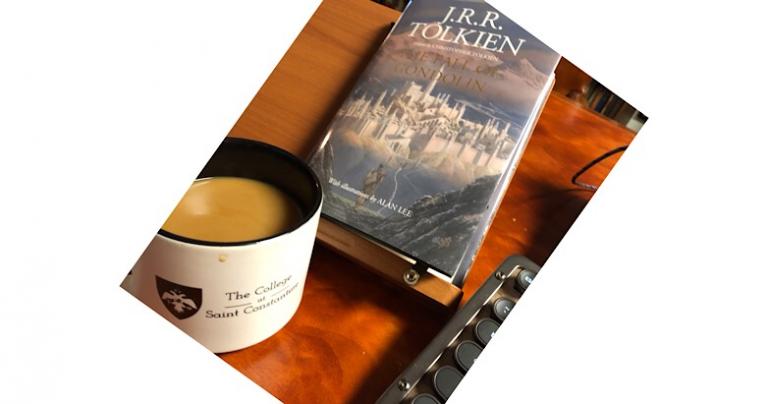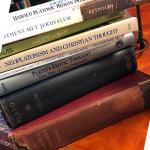 The Fall of Gondolin is for the serious reader of JRR Tolkien’s mythology, but not one so serious that he is offended by the “Elvish” of the Peter Jackson movies. This is for the readers who takes Tolkien seriously, but is not a scholar of the series.
The Fall of Gondolin is for the serious reader of JRR Tolkien’s mythology, but not one so serious that he is offended by the “Elvish” of the Peter Jackson movies. This is for the readers who takes Tolkien seriously, but is not a scholar of the series.
Not everything Christopher Tolkien has edited from his father’s work has been so easy. Christopher Tolkien has given us works of scholarship showing the development of his father’s ideas spanning an entire history of the making of Middle Earth that will be the subject of dissertations on Christopher Tolkien’s choices.
If you thought the Lord of the Rings trilogy was wonderful and the Silmarillion difficult, a little disappointing in lack of literary polish, then most of what Christopher Tolkien has revealed about his father’s work is not for you. That’s most of my students. There are a few who study the making of the most important fantasy world this side of Atlantis carefully and for those students the slow arrival of a new History has been a scholarly Christmas treat.
I am between those readers: caring enough (due to an interest in Plato and myth) to read the books, not enough to master the content. Tolkien scholars (and super-fans) know the material and one is bound to make an error when commenting on the canon. When errors are made, emails follow. I proceed with caution.
The last two books from Christopher Tolkien, he claims the last two he will release, have taken an approach to the unpublished works that is (for me) less for the scholar (or super-fan) and more for the serious reader. One tale is studied and alternatives are given in turn with Christopher Tolkien giving his insights (sometimes personal) into what his father was doing as he created the story.
The Fall of Gondolin is the story of the overthrow of the hidden Elvish city in Lord of the Rings as a distant tragedy. The Elves face ruin at the hands of Melko, an evil so great Sauron is a mere lieutenant, but the great Elf city of Gondolin has defied detection abd so destruction. These Gnomes (as Tolkien calls them) hide and thrive, refusing to risk the end of their beautiful city even when challenged to come forth by a friendly god. It is no spoiler to say: Gondolin falls.
The story is beautifully told and several passages related to the doom of the city achieve some of the best mythic writing in all of Tolkien.
Yet Ildril spoke against this, and persuaded the lords that they trust not to magic of that way that had aforetime shielded it from discovery: ‘for what magic stands if Gondolin be fallen?’
If mythic writing (Plato’s Timaeus) is a genre you enjoy or study, this sentence will haunt.
The great, beautiful Elvish home hidden and guarded by great walls and gates is annihilated. A great lesson of the Tolkien canon is confirmed again: Nothing endures in this life and no beauty can hide from evil. Goodness grows or if it stagnates the good is corrupted, like a cult in a compound or falls to evil in spectacular failure.
Christopher Tolkien has produced a short book centered on Gondolin’s awesome doom.
The book is beautifully illustrated by Alan Lee and great care was put into the production (paper and typeface). I hesitate to point to an error. On page 291, I read: “They dwelt in Gondor a year, and it is said that at this time Hurin learned something of the counsels and purposes of Turgon: for he had a great liking for them and wished to keep them in Gondolin.”
Isn’t “Gondor” a jarring error in this passage? Or is this usage based on a fact I am missing (as a non-scholar)? I ask, because this work feels a bit hasty overall, rushed, or not quite up to the care one expected from Christopher Tolkien. The amount of new content compared to the hardcover price seems less than we have grown to expect.
Regardless, no father ever left his literary estate in better hands than Christopher Tolkien. He has edited his father’s work and so (indirectly) in the choices he has made become almost a co-author and creator. The Silmarillion should someday have Christopher Tolkien added as a co-author* as the editing choices and new material added to smooth out the unfinished manuscripts is very great. When all of JRR Tolkien’s notes and materials become public, other scholars will make different choices about what the great man meant and Christopher Tolkien’s “JRR Tolkien” will be one of many scholarly options, even if he always has a privileged place.
That’s how scholarship works.
Meanwhile, for those of us, his faithful readers, that mostly read of Middle Earth for pleasure and wisdom, The Fall of Gondolin is worth the time. There is pleasure in the hardcover and wisdom in the text. JRR Tolkien was no fan of modernity, but he knew that if the magic of Gondolin could not stand against evil, then no magic or hiding could stand.
Better to venture forth like Samwise and Frodo and do the job of our age than trust to the long walls of Gondor . . . Or as the Elves did earlier in the hidden city of Gondolin.
Wisdom.
Let us attend.
————————————-
*I would suggest: The Silmarillion by JRR Tolkien with Christopher Tolkien.












